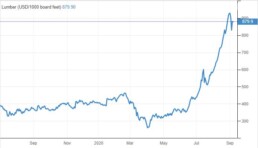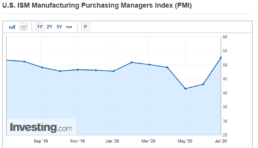Welcome sell-off!
I have always loved the sell-offs. It makes a line between the fools that simply try to ride the momentum and the proper long-term investors that are not scared about the volatility. Still, they act on it, taking advantage of the volatility to gain a position that, with time down the line, will indeed make a difference.
If you don’t know why you bought a stock in the first place and just bought it thinking it will go up, you then will drop it when it does not, and you deserve to lose money. I don’t blink when I see my stock dropping but evaluate if the market is cheap enough to have another bite. As many would have told you, I only sell when the fundamentals have changed, or when the market is willing to overpay ridiculously. In that case, I might just let it go, but sometimes even that is not easy or right either.
For instance, I recently have trimmed my Apple’s position, and the split momentum added billions of market cap without any fundamental reason. The valuation was too rich, I had Apple from a price of $69 pre-split, so when I sold part of it at $510, people would think I did great. Well, I have learned that you never sell compounder. However, I have spotted some others with lower valuation, it was a tough decision to take, very hard to let part of my Apple shares go, but finally, I did it. If the market would drop a bit more, I would probably buyback.
Besides the diversion, let’s look deeper into what the market is telling us, what is happening, and what my move will be.
I was exploring some statistics and, while diving in numbers, got impressed by how the media is altering the information to satisfy their cheeky agenda, which is definitely not your financial freedom but the opposite. They need to scare you in order to get things cheaper. Wall Street and the media have an alliance, I think, which has the purpose of scaring mom and daddy’s money.
Please don’t trust the misinformation of those panic disseminators but instead look at the numbers by yourself, learn where to find them, and how to interpret them.
Congress hasn’t yet come to an agreement. The payroll tax has been suspended through an executive order, but if Trump is reelected, it will likely be tax forgiveness. Otherwise, double taxes would need to be paid, and this could create some small frictions on the market.
The fantastic best news was the monetary policy. Powell is telling us what to do, he is our guide, and is saying “don’t worry, right now we don’t care about inflation, we would allow inflation to rise above 2%.” In case it does, to keep up for some time, and also, Powell had many times in his interventions said that their model is not working correctly, they are not even sure that inflation would rise that quickly. They are much more worried about deflation than inflation. That’s the message we need to collect in order to invest.
We are going to experience a very bullish market in the next two quarters. After some corrections, in the next few months and for all 2021, we are going to see assets inflating, and we need to take advantage of those movements because we won’t see prices so low anymore in some of the equity.
This week the unemployment number dropped to single-digit. We are doing really well, 8.4%, which means that 2.8 million dropped in unemployment, which is a massive number. Many small businesses are bankrupting and restarting companies, so there is this new trend, and I think many young entrepreneurs are just reorganizing themselves, especially in the US. I am not concerned about how harmful bankruptcy could become for the economy at this stage.
Real estate prices are increasing in many parts of the USA. People are buying in the countryside and taking advantage of low-interest rates. They purchase real estate based on their mortgage payment, not based on prices. If their mortgage payment is convenient enough, real estate goes up in the USA, especially the RE related to the demand, which is personal and not motivated by investment reasons.
About Antonio Velardo
Antonio Velardo is an experienced Italian Venture Capitalist and options trader. He is an early Bitcoin and Ethereum adopter and evangelist who has grown his passion and knowledge after pursuing the Blockchain Strategy Programme at Oxford University and a Master’s degree in Digital Currency at Nicosia University.
Velardo manages an 8-figure portfolio of his investment company with a team of analysts; he is a sort of FinTweet mentor, people interact with him online, and he has more than 40,000 followers after his tweets. He has built a fortune in the great tech years and put together a tail strategy during the pandemic that allowed him to take advantage of the market drop. “I did not time the market, and I did not think this was even a black sworn,” he says.
On the side of the financial markets, Velardo has a unique combination. He was a real estate entrepreneur that developed several projects in Tunisia, Miami, Italy, the UK, and many other countries and cities. But he has always been passionate about options trading. Still, contrary to the volatility player and quant trading, he always had a value investing touch in his blood. Antonio studied Value Investing at Buffet’s famous business school at Columbia University. Even though the central concepts of value investing are antagonists to the venture capital pillars, Antonio’s approach tries to bridge elements of both worlds in order to seek alpha. Velardo has learned the importance of spotting pure growth stories and taking advantage of their S-Curve position. This is an essential element of Velardo’s approach as he looks forward to embracing great tech stories at the right time of the adoption cycle. This applies to stocks but also to blockchain projects.

Indeed the price of lumber is high, and its continually increasing. Prices went from $300 to a pick of $934, and this makes a strong case for USA builders and demand for housing.

Even the ISM manufacture index is doing well.
Money is moving across asset classes, and the young entrepreneurs are making money at a pace never seen before. Once the election volatility is over, we will be, especially if Trump gets reelected, on a path toward the sky.
The big swap you might have already noticed is between the old type of stock and the new one. Older stocks that did not spend in innovation or made strategic acquisitions are suffering and are going to be destroyed by the new innovative and disruptive businesses.
There is a lot of rumor about how financials are cheap, how Well Fargo and Chase are cheap, but why don’t we try to listen to the market that is suggesting us to look at the disruption and how companies like Paypal or Square have changed the payment system? With all this activity on the DeFi market, I expect to see many more older-type of banks getting to the same place that the oil companies are now. Banks, if they don’t invest in innovation through acquisition, will not be able to survive or will shrink dramatically under the new FinTech disruption.
I am currently selling my Well Fargo shares, a small position, and take advantage of this sell-off to increment my position in Square.
Bonds are dead. Bonds are not even working as a hedge, and producing real negative returns, listen to what Powell has been telling you. If you want to survive and conquer your financial independence, you have to be able to swallow this volatility, and the only place where you can have returns is in equity. Change your frame of mind about risk; volatility is not risk. Risk is buying something you don’t understand, just hoping that it will go up.
I welcome this correction; it is there to eliminate all those short-term gamblers, the fools that believe the market only goes up and don’t know what they buy. Education and information is the only thing that can keep you alive in a volatile market. You need to have a thesis based on research and understand why you are holding that equity. Like Damodaran says, when the market drops intensely, you need to know why you are holding, and valuation is the only thing that can save you.
If you don’t know the value, at least try to understand the reasons behind your investments. For instance, you could invest in a disruptive company that you know is going to change the existing paradigm and therefore increase in value, as we spoke above about FinTech.
With the new monetary policy, the P/E valuation, as I have written in my precedent articles, will change. Especially for tech companies, we will experience a new paradigm under which the P/E will need to be approached differently, because the growth in the middle of the disruption will be accelerated, so multiple will be higher than what it is in our old paradigm. Don’t forget that P/E makes sense only if it is correlated to growth. At higher growth, we would obviously justify a much higher P/E.
Before talking about a bubble, let’s understand the new paradigm, especially for those disruptive companies that will change the world. Those corrections will be an excellent chance for us in the long-term to accumulate stocks at a discount. Hold tight and enjoy the trip. I hope on Tuesday the sky keeps falling because I need to buy more, and I love sales.